
Kevin B. Johnson Co-Authors National Academy of Medicine AI Code of Conduct
Kevin B. Johnson, MD, MS, co-authored a National Academy of Medicine report guiding the ethical use of AI in health and medicine.

Dr. Yong Chen’s Study on Long COVID in Children Named a 2026 Top 10 Clinical Research Achievement
Congratulations to Dr. Yong Chen on his RECOVER-EHR study being named a 2026 Top 10 Clinical Research Achievement.
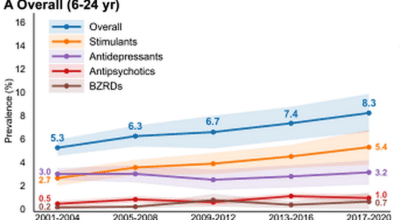
Study Finds Increasing Psychotropic Medication Use and Drug Interaction Risks in U.S. Youth
A DBEI-led study found rising psychotropic medication use among U.S. youth, along with growing safety concerns such as polypharmacy and potential drug–drug interactions.

PhD Student Julia DiTosto Co-Authors Study Linking Uterine Fibroids to Increased Cardiovascular Risk
A study co-authored by PhD student Julia DiTosto analyzed data from more than 2.7 million individuals and found that uterine fibroids may be associated with a significantly higher risk of cardiovascular disease.

Alumni Spotlight: Cameron Baston, MD, MSCE
Before joining the Perelman School of Medicine as an Associate Professor of Clinical Medicine, Cameron Baston, MD, MSCE, completed his MSCE at the University of Pennsylvania.

Community Spotlight: Zixuan (Eleanor) Zhang
Zixuan (Eleanor) Zhang, PhD, is a postdoctoral researcher in the Department of Biostatistics, Epidemiology and Informatics whose work focuses on statistical and computational methods in statistical genetics. In this Q&A, she shares what inspired her research and what she values about the DBEI community.

Dr. Jeffrey Morris Clarifies How Vaccine Safety Is Monitored in the U.S.
Jeffrey S. Morris, PhD, analyzes the U.S. vaccine safety monitoring system and suggests improvements in a new APPC white paper.

Save the Date: Workshop on Penn CFAR–PDPH Research Collaborations, March 17, 2026
Save the Date – March 17, 2026. Join Penn CFAR and the Philadelphia Department of Public Health for a workshop highlighting opportunities for collaborative HIV research and high-impact partnerships supporting Ending the HIV Epidemic in Philadelphia.

How Evidence-Based Advocacy is Shaping FDA Drug Labels
In a recent interview, Dr. Sean Hennessy highlights how scientific evidence and advocacy can drive FDA label changes that expand access to safe, effective medications.

Congratulations to Dr. LauraEllen Ashcraft on Her New Role as Co-Director of AMETHIST@Penn
Dr. LauraEllen Ashcraft has been named Co-Director of AMETHIST@Penn, where she will help lead efforts to support the NIH IMPROVE initiative and advance equitable maternal health research through implementation science.

Community Spotlight: Kyle Busse
Kyle Busse, PhD, MPH, is a postdoctoral researcher in the Department of Biostatistics, Epidemiology and Informatics whose work focuses on how lifestyle factors influence reproductive and perinatal health. In this Q&A, he discusses the experiences that shaped his research interests and what he values about being part of the DBEI community.
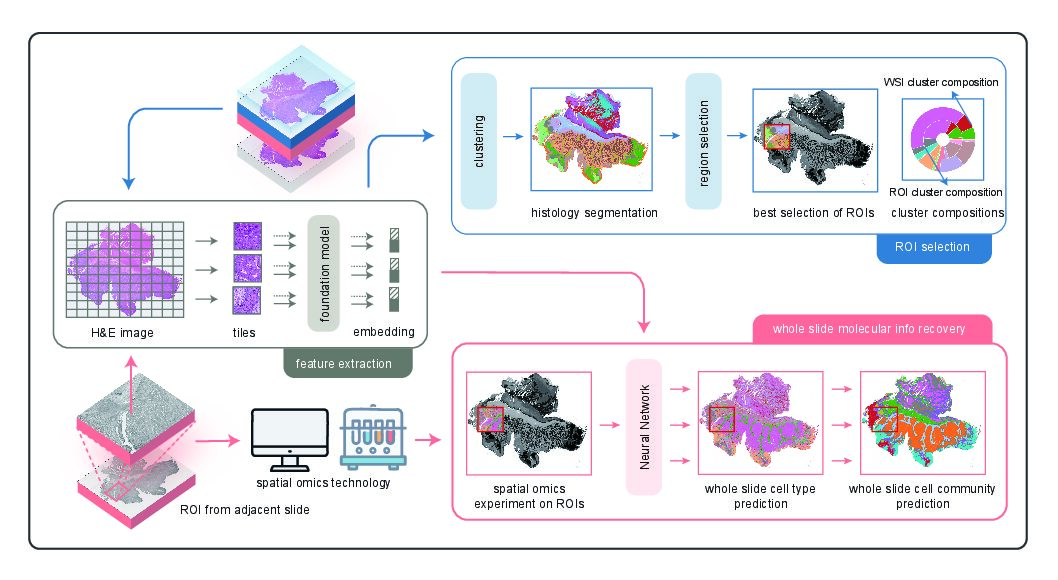
New Smart Spatial Omics Workflow Boosts Efficiency and Accuracy in ROI Selection
A new paper led by DBEI faculty member Mingyao Li, PhD, introduces smart spatial omics (S2-omics), an automated workflow that improves the rigor and reproducibility of spatial omics experiments.

Community Spotlight: Kenneth M. Lee
Kenneth M. Lee, PhD, is a postdoctoral researcher in the Department of Biostatistics, Epidemiology and Informatics whose work centers on palliative care and statistical methods for cluster-randomized trials. In this Q&A, he reflects on the motivations behind his research and his experience within the DBEI community.

New Study by Dr. Ricardo Castillo Finds Rabies Risk Concentrated in Disadvantaged Neighborhoods
A new study by Dr. Ricardo Castillo identifies stark rabies inequities in Arequipa driven by neighborhood socioeconomic status.
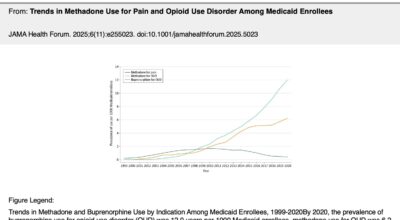
National Medicaid Study Shows Rising Use of Methadone and Buprenorphine for OUD
Penn researchers have received NIH/NIBIB funding to develop robust and interpretable multi-modal AI models that integrate genomics, imaging, and electronic health data to advance cancer and Alzheimer’s disease research.
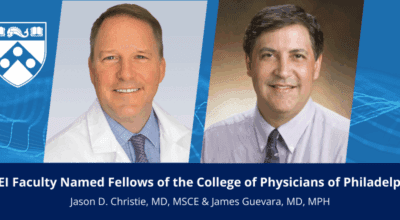
Drs. Christie and Guevara Named Fellows of the College of Physicians of Philadelphia
Congratulations to Drs. Jason D. Christie and James P. Guevara on their election as Fellows of the College of Physicians of Philadelphia, recognizing their impactful contributions to medicine and public health.

Dr. Qi Long and Collaborators Awarded NIH R01 Grant to Advance Robust and Interpretable Multi-modal AI for Precision Medicine
Penn researchers have received NIH/NIBIB funding to develop robust and interpretable multi-modal AI models that integrate genomics, imaging, and electronic health data to advance cancer and Alzheimer’s disease research.

Community Spotlight: Kwangmoon Park
Kwangmoon Park, PhD, is a researcher in the Department of Biostatistics, Epidemiology and Informatics whose work focuses on gene regulation using large-scale single-cell data. In this Q&A, he shares insights into his research and his experience in the DBEI community.

Jiancong Xiao, Weijie Su, and Qi Long Develop Innovative Strategy for Mitigating Algorithmic Bias in Modern AI Models
A new method helps prevent “preference collapse” in AI training, offering a fairer, more balanced approach to aligning large language models.

Alumni Spotlight: Joshua F. Baker, MD, MSCE
Before joining DBEI as an Associate Professor of Medicine and Epidemiology, Joshua F. Baker, MD, MSCE, completed his MSCE at the University of Pennsylvania.

AI Tool RCANE Accurately Predicts Cancer Copy-Number Aberrations from RNA-Seq Data
Dr. Hongzhe Li’s team developed RCANE, an AI tool that predicts cancer copy-number aberrations from RNA-seq data, offering a faster, lower-cost alternative to DNA sequencing.

Community Spotlight: Natalia Irvine
Natalia Irvine, MPH, is a Research Project Manager for the Center for Health Innovations in Reproductive and Perinatal Population Research (CHIRP). Her work supports studies focused on advancing reproductive and perinatal health. In this Q&A, she shares her experience joining the DBEI community.

Alumni Spotlight: Shaun Bender, MS, PhD
Before joining Alnylam Pharmaceuticals, Inc. as a Director of Medical Affairs Biostatistics, Shaun Bender, MS, PhD, completed his PhD in Biostatistics at the University of Pennsylvania.

Drs. Xiang Li, Weijie Su, & Qi Long Propose a Novel Strategy for Robust Detection of AI-Generated Text
Penn researchers have developed an innovative approach for detecting AI-generated text that remains accurate even after human edits.

Community Spotlight: Jagadeesh Puvvula
Jagadeesh Puvvula, PharmD, PhD, MPH, is a trainee in the Department of Biostatistics, Epidemiology, and Informatics, whose work explores how early-life environmental exposures impact human health. In this Q&A, he shares insights into his research, the real-world relevance of environmental health studies, and the value he finds in mentorship and interdisciplinary collaboration.

Nandita Mitra, PhD, Honored with Two Penn Medicine Awards of Excellence
Nandita Mitra, PhD, was honored with two 2025 Penn Medicine Awards of Excellence for her outstanding contributions to research and education.

Dr. Qi Long and Collaborators Awarded NIH R01 Grant to Advance Neurosymbolic AI for Smart and Trustworthy Healthcare
Dr. Qi Long and collaborators have received NIH/NIBIB funding to advance neurosymbolic AI for smarter, more trustworthy healthcare.

Study Shows COVID-19 Reinfection More Than Doubles Long COVID Risk in Children
A new study in The Lancet Infectious Diseases shows that COVID-19 reinfection in children significantly increases the risk of long COVID and other serious health complications.
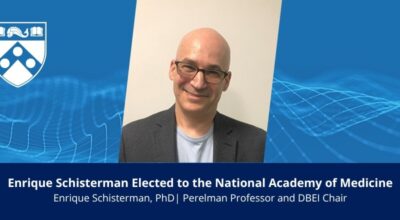
DBEI Chair Enrique Schisterman Elected to the National Academy of Medicine
DBEI Chair Enrique Schisterman, PhD, has been elected to the National Academy of Medicine, one of the most prestigious honors in health and medicine.
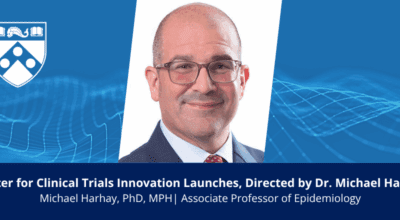
Center for Clinical Trials Innovation Launches Under the Leadership of Michael Harhay, PhD, MPH
Michael Harhay, PhD, MPH, leads the newly launched Center for Clinical Trials Innovation, a hub dedicated to advancing clinical trial methods and improving research outcomes worldwide.

Dr. Hongzhe Li and Haoshu Xu Develop Novel Machine Learning Framework for Single-Cell Analysis
A new study by Dr. Hongzhe Li and AMCS PhD student Haoshu Xu introduces a machine learning framework that enables large-scale analysis of single-cell data, offering new insights into how gene co-expression networks shift with age.

Dr. Yong Chen and Dr. David Wolk Awarded NIH U24 Grant to Advance Alzheimer’s Research
Penn faculty Dr. Yong Chen and Dr. David Wolk have received a landmark NIH U24 award to lead national efforts to improve data quality and advance Alzheimer’s research.

Congratulations to Dr. Nandita Mitra on Her Election as ENAR President-Elect
Dr. Nandita Mitra has been elected President-Elect of ENAR, a leading professional society for biostatistics and quantitative research.

Dr. Li Shen Appointed Interim Director of the Division of Informatics
We're excited to share that Li Shen, PhD, has agreed to serve as Interim Director of the Division of Informatics.

Dr. Sunni Mumford Appointed Director of the Division of Epidemiology
DBEI proudly welcomes Sunni Mumford, PhD, as the new Director of the Division of Epidemiology.

Penn Researchers Develop Model to Predict Risk of Stimulant Overdose
Penn researchers developed a highly accurate model to predict who is most at risk of overdose from stimulants such as cocaine and methamphetamine—offering a promising tool to guide early intervention and prevention efforts.

New Study Explores Links Between BMI, Breast Density, and Breast Cancer Risk
Dr. Anne Marie McCarthy has co-authored a new article examining how body mass index (BMI) and breast density interact to influence breast cancer risk among Black and White women.

Bridging the Gap Between Theory and Practice in Implementation Science
Laura Ellen Ashcraft, PhD, MSW, introduces GUIDE—a new tool that turns complex implementation science theory into practical steps for early-career researchers.

A Seven-Step Framework for Strengthening Interdisciplinary Evaluation
LauraEllen Ashcraft and collaborators outline a seven-step framework in BMJ Open Quality to strengthen evaluation planning and interdisciplinary collaboration.

iSCALE Unlocks Molecular Maps of Large Human Tissues
Dr. Mingyao Li co-authored a study demonstrating iSCALE, a method that maps large human tissues at molecular and spatial resolution, uncovering disease features previously invisible.
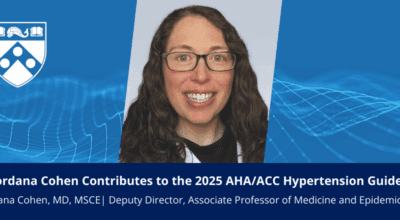
Dr. Jordana Cohen Contributes to Updated National Hypertension Guidelines
Jordana Cohen, MD, MSCE, contributed to the 2025 AHA/ACC Hypertension Guideline–the first national update since 2017–introducing major changes in risk assessment, screening, and treatment. Her work was featured in an NPR interview highlighting these advances.

Drs. Yehya and Harhay Awarded NIH R01 for Pediatric ARDS Trial
Drs. Nadir Yehya and Michael Harhay received a 5-year R01 grant from NICHD to lead the PARMA trial, a study advancing treatment strategies for pediatric ARDS.

Dr. Todd Miano Named 2025 Recipient of the ACE Early Career Epidemiologist Award
Congratulations to Dr. Todd Miano, recipient of the American College of Epidemiology’s 2025 Early Career Epidemiologist Award. This honor recognizes his outstanding contributions to advancing drug safety research and shaping the future of acute care pharmacoepidemiology.

Dr. Samantha Piekos’ Study Shows Placental Biology Varies Across Pregnancy Complications
Dr. Samantha Piekos’ study shows how placental biology varies across pregnancy complications, highlighting the power of a systems biology approach to distinguish complex pregnancy syndromes.
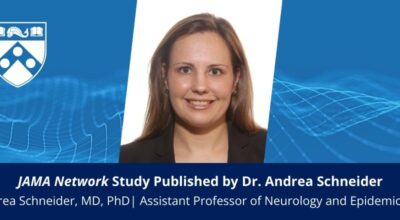
Dr. Andrea Schneider Examines How Vascular Risks Impact Cognitive Recovery After Brain Injury
Dr. Andrea Schneider’s study finds that vascular risks, particularly diabetes, are linked to slower cognitive recovery after traumatic brain injury.

Dr. Mary Putt’s Study Reveals How Sleep Drive Influences Seizure Severity
Dr. Mary Putt and her team contributed to new research exploring how sleep drive impacts seizure severity and identifies a potential way to reduce them.

Congratulations to Dr. Mitra on Joining Penn’s Academic Planning and Budget Committee
Join us in congratulating Dr. Nandita Mitra on her appointment to Penn’s Academic Planning and Budget Committee, where she will help guide the University’s academic and financial planning.
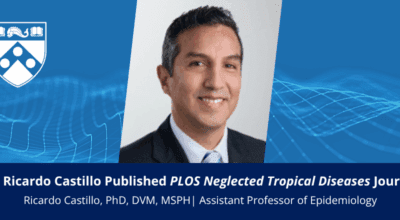
Ricardo Castillo Identifies Critical Gaps in Global Dog Rabies Vaccination
Ricardo Castillo’s new study identifies critical barriers to mass dog rabies vaccination campaigns and proposes strategies to eliminate dog-mediated human rabies by 2030.
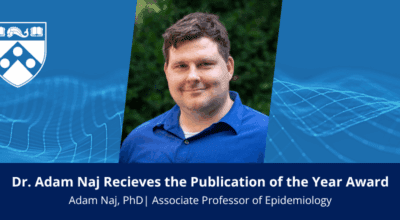
Congratulations to Dr. Adam Naj on Receiving the Publication of the Year Award!
Congratulations to Dr. Adam Naj, honored with the Publication of the Year Award for a major study on PSP genetics published in Nature Communications.
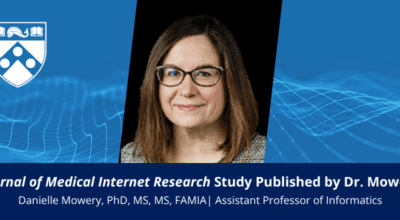
New Publication by Dr. Danielle Mowery Explores How Patients Engage with Post-Discharge SMS
Dr. Danielle Mowery’s new study explores how patients engage with SMS systems after hospital discharge and what those patterns reveal about future care needs.

Dr. Jeffrey Morris Speaks Out on Vaccine Study Bias in Major News Outlets
Dr. Jeffrey Morris was featured in The Atlantic and New York Magazine’s Intelligencer, where he discussed major flaws in widely cited vaccine studies and the risks of bias in study design.
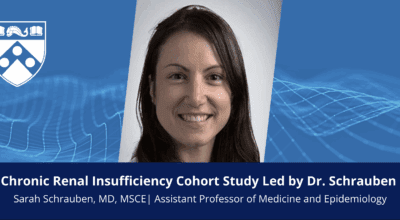
Sarah Schrauben Leads 7-Year Study Using Urine Biomarkers to Assess Kidney Disease Risk
Sarah Schrauben, MD, MSCE, led a 7-year study showing how urine biomarkers may help noninvasively track kidney disease in diabetic patients.

Community Spotlight: LauraEllen Ashcraft
LauraEllen Ashcraft, PhD, MSW, is an Assistant Professor of Epidemiology whose research focuses on implementation science, equity, and translating evidence into sustainable practices in real-world health care settings.

Community Spotlight: Julia DiTosto
Julia DiTosto, MS, is a PhD student in Epidemiology whose research explores how gynecologic conditions like fibroids and PCOS may impact long-term heart health. Using real-world data and causal inference methods, she aims to generate insights that improve care for reproductive-age populations.
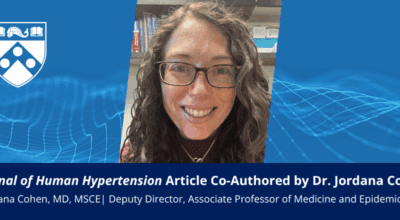
Journal of Human Hypertension Article Co-Authored by Dr. Jordana Cohen
A new study co-authored by Dr. Jordana Cohen explores the risks of white coat hypertension and emphasizes the importance of out-of-office blood pressure monitoring for accurate diagnosis and treatment.

Penn Medicine’s Mobile Mammogram Van Rolls Out July 13 at West Philly Health Fair
Carmen Guerra, MD, MSCE, is launching a mobile mammography program on July 13 to expand access to mammography for communities in and around Philadelphia.

Congratulations to Dr. Ellie Caniglia on Receiving the Brian MacMahon Early Career Epidemiologist Award!
Congratulations to Dr. Ellie Caniglia on receiving the Brian MacMahon Early Career Epidemiologist Award in recognition of her outstanding contributions to epidemiology.
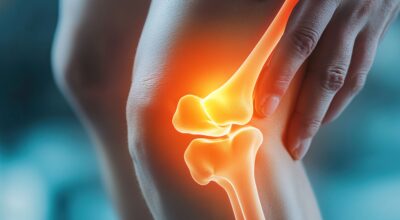
Symptom-Based Clusters in Psoriatic Arthritis Reveal Different Treatment Responses
Dr. Alexis Ogdie co-authored a study published in the Annals of the Rheumatic Diseases that explores distinct patient groups and treatment responses in psoriatic arthritis.

What Matters Most: Treatment Goals from the Perspective of People Living with Psoriatic Arthritis
A new study in Arthritis Care & Research, co-authored by Dr. Alexis Ogdie, explores patient-defined treatment goals in psoriatic arthritis.

Dr. Alexis Ogdie Featured on Medscape’s InDiscussion Podcast
Dr. Alexis Ogdie joins Medscape’s InDiscussion podcast to talk about digital tools for psoriatic disease, including the development of the Psorcast app and the future of technology in rheumatology care.
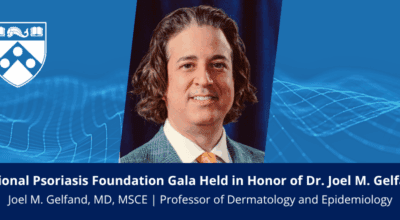
Celebrating Dr. Joel M. Gelfand at the National Psoriasis Foundation Gala
Congratulations to Dr. Joel M. Gelfand on being honored with a gala celebrating his groundbreaking contributions to dermatology, epidemiology, and patient-centered research.

Community Spotlight: Dr. Karen Glanz
Karen Glanz, PhD, MPH, is the George A. Weiss University Professor with joint appointments in Penn’s Perelman School of Medicine and School of Nursing. Her work focuses on translating theory into practice to address critical public health issues like physical activity, obesity, and health equity.

Dr. Alisa Stephens Shields’ JAMA Network Article
Congratulations to Dr. Alisa Stephens Shields on her recent JAMA Network Open publication evaluating the impact of COVID-19 self-test kit distribution in underserved communities.

Alumni Spotlight: Arman Oganisian, BA, MS, PhD
Before joining Brown University as an Assistant Professor of Biostatistics, Arman Oganisian, PhD, completed his PhD in Biostatistics at the University of Pennsylvania.

Congratulations to Basam Alasaly on His Presentation at the AMIA Clinical Informatics Conference
Congratulations to Basam Alasaly, from Penn Medicine’s AI4AI Lab, for presenting at the AMIA 2025 Clinical Informatics Conference.

Community Spotlight: Dr. Jordana Cohen
Jordana B. Cohen, MD, MSCE is an Associate Professor of Medicine and Epidemiology in the Department of Biostatistics, Epidemiology, and Informatics, a Senior Scholar in the Center for Clinical Epidemiology and Biostatistics (CCEB), and a Fellow at the Leonard Davis Institute of Health Economics.

Dr. Mary Putt’s Publication in Physician’s Weekly
Congratulations to Dr. Mary E. Putt on her recent publication in Physician’s Weekly exploring how brain activity following electroconvulsive therapy (ECT) could hold new clues for improving treatment of severe, treatment-resistant depression.

Dr. Kevin B. Johnson’s REDCap Publication in The Scientist
Congratulations to Dr. Kevin B. Johnson on his publication in The Scientist highlighting the development and global impact of REDCap as a vital tool for clinical research data management.

Congratulations to Dr. Nandita Mitra on Her Election as President of the Society for Causal Inference
Congratulations to Dr. Nandita Mitra on her election as President of the Society for Causal Inference. This leadership role recognizes her longstanding contributions to the field and her commitment to advancing research and collaboration in causal inference.
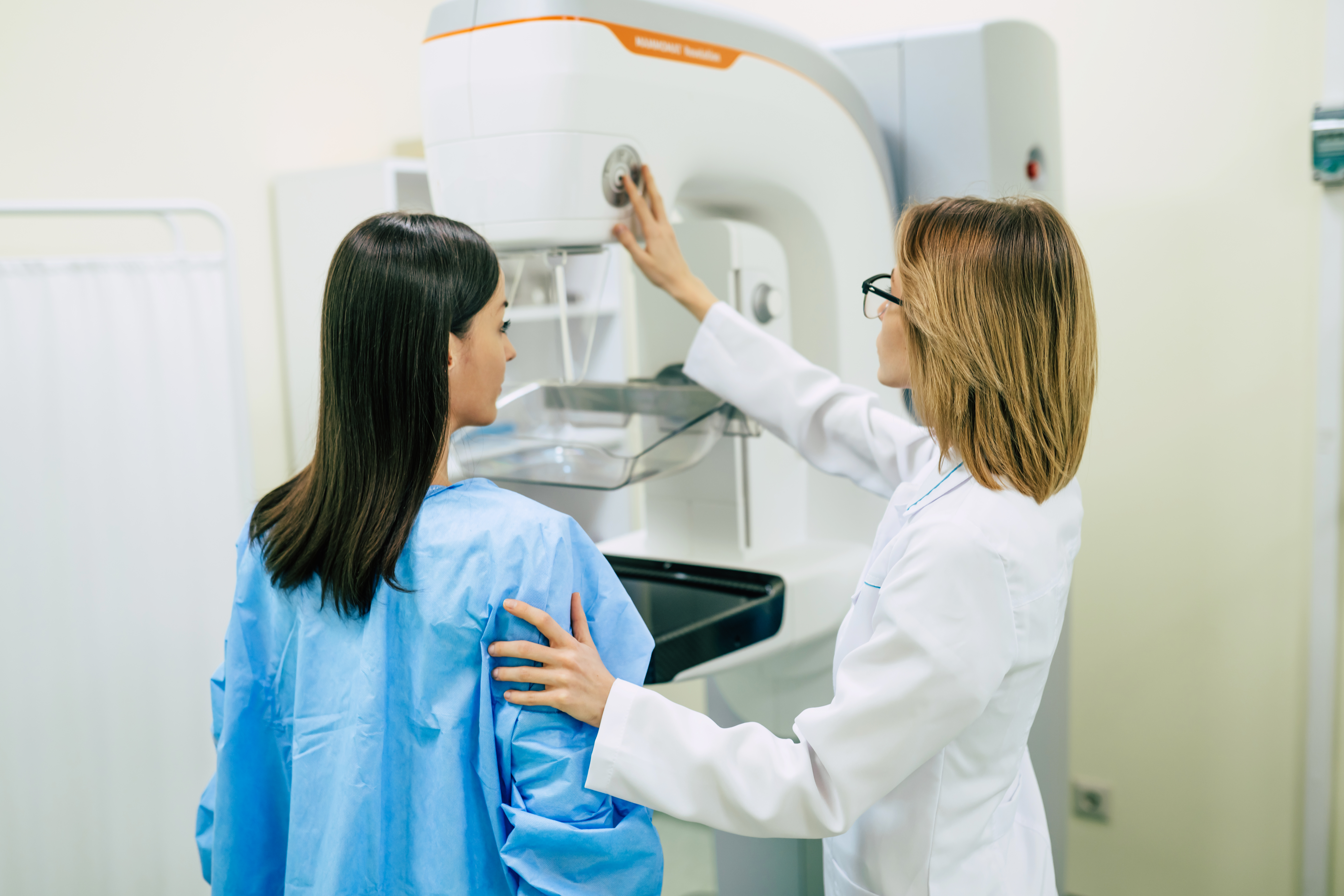
Dr. Anne McCarthy’s Publication, “Radiomic Parenchymal Phenotypes of Breast Texture from Mammography and Association with Risk of Breast Cancer”
Congratulations to Dr. Anne Marie McCarthy on her recent publication in Radiology, highlighting how advanced imaging techniques can uncover subtle breast tissue patterns linked to cancer risk.

Dr. Rui Xiao’s Publication, “Zebrafishology, study design guidelines for rigorous and reproducible data using zebrafish”
Congratulations to Dr. Rui Xiao on her Nature publication offering new guidelines to support rigorous and reproducible research using zebrafish, a key model in biomedical science.

Dr. Mingyao Li’s Nature Publication, “Spatial Transcriptomics Reveals Human Cortical Layer and Area Specification”
Read about Dr. Mingyao Li's recent publication in Nature, which maps early human brain development using spatial transcriptomics. The study reveals that cortical layers and areas are specified earlier than previously thought, offering new insight into how the brain takes shape.

AIDS Article Authored by Penn Researchers, “Association of HIV status with infections complicating abortion in Botswana”
Penn researchers have published new findings in AIDS showing that HIV status may influence the risk of infection following abortion. The study focuses on patients in Botswana and underscores the importance of improving reproductive health care and equity for people with HIV.

Dr. Sean Hennessy’s Publication in the American Journal of Epidemiology
Read about Dr. Sean Hennessy's recent publication in the American Journal of Epidemiology, which uses a new statistical method to better understand the real-world effects of testosterone therapy. The study offers valuable insights into balancing its potential benefits and risks in clinical care.
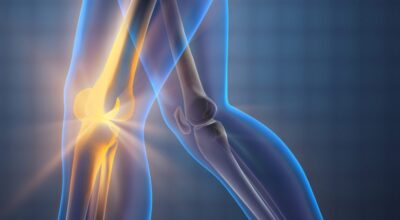
Dr. Joshua Baker’s Review, “Metabolic Consequences of Rheumatoid Arthritis”
Read about Dr. Joshua Baker's invited review explaining the connection between rheumatoid arthritis and metabolism, and how this link affects patient care amid new obesity treatments and improvements in arthritis management.

Dr. Jordana Cohen’s Editorial, “Rethinking Confirmatory Testing in Primary Aldosteronism”
Read about Dr. Jordana Cohen's editorial in Annals of Internal Medicine, where she highlights important considerations around diagnostic testing for primary aldosteronism and its impact on patient care.

Qi Long Named Institute of Mathematical Statistics Fellow
Qi Long, Professor at the University of Pennsylvania, has been named a Fellow of the Institute of Mathematical Statistics—a prestigious honor awarded for his impactful work in advancing data science and applying statistics to improve biomedical research.
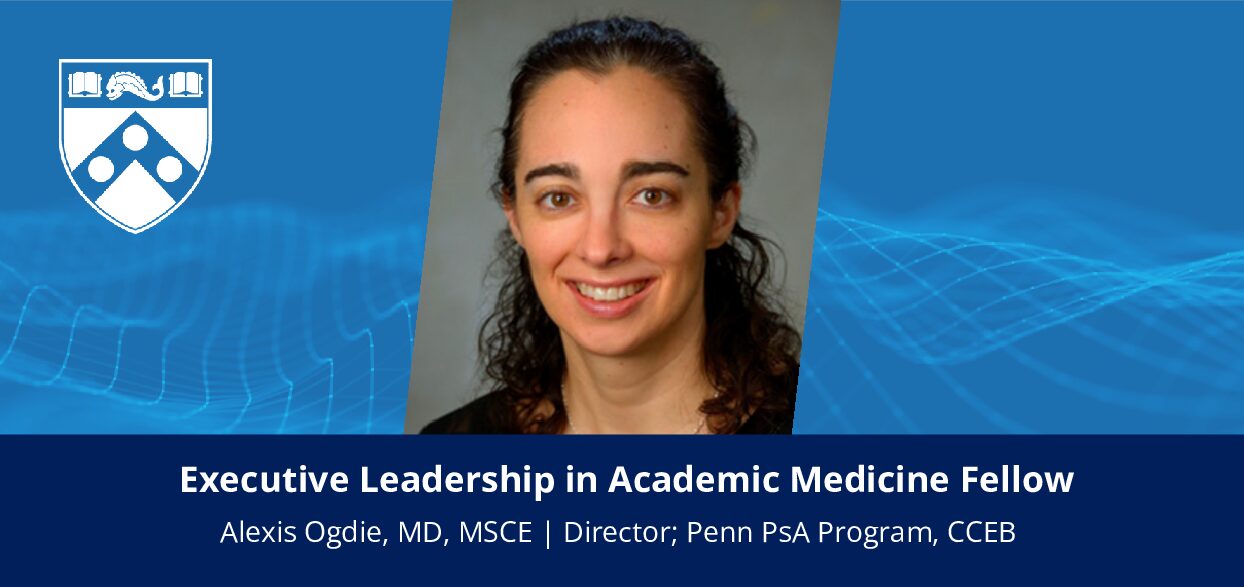
Alexis Ogdie, MD, MSCE, selected Executive Leadership in Academic Medicine Fellow
Alexis Ogdie, MD, MSCE, selected Executive Leadership in Academic Medicine Fellow.

Dr. Yong Chen Awarded $8 Million to Advance Mental Health Diagnostics Using AI
Dr. Yong Chen has been awarded $8 million to lead a national effort using AI to improve how mental health conditions are diagnosed and treated—part of a larger $150 million initiative to advance mental health research.

Income Differences Explain Racial Disparities in IBD Care, Study Finds
A new study led by James Lewis, MD, MSCE, finds that racial and ethnic gaps in IBD care are closely tied to socioeconomic factors—highlighting the need for more equitable access to treatment and specialist care.

Visual Impairment, Age-Related Eye Disease, and Sleep Dysfunction in Older Adults
Sleep issues are common in older adults–but vision problems may be part of the cause. A new study by Alan Y. Huang, Joshua R. Ehrlich, and Ali G. Hamedani finds that those with visual impairments are more likely to use sleep medications, highlighting a connection between eye health and sleep quality.

Widespread Statistical Problems with Dietary Trials
Flawed study designs in nutrition research may be leading to misleading advice about healthy eating. DBEI’s Mary E. Putt, ScD, and co-authors warn that many popular dietary trials are too short and poorly structured to give reliable results-putting future nutrition guidelines at risk.

Jinbo Chen, PhD elected 2024 American Association for the Advancement of Science Fellow
Jinbo Chen, PhD elected 2024 American Association for the Advancement of Science Fellowof this post here.

Nandita Mitra, PhD, has been awarded the Lindback Foundation Award for Distinguished Teaching
Nandita Mitra, PhD has been awarded the Lindback Foundation Award for Distinguished Teaching.

Dr. Eric Tchetgen Tchetgen Awarded David Cox Medal for Statistics
Dr. Eric Tchetgen Tchetgen has been awarded the inaugural David Cox Medal for Statistics, which honors mid-career researchers for outstanding contributions to the field.

Electronic Nudges Improve End-of-Life Care Discussions in ICUs
Penn researchers, including Drs. Halpern and Harhay, found that electronic nudges improved end-of-life care discussions in ICUs, increasing hospice discharges and comfort-care orders without shortening hospital stays.

From Nudge to Habit: Penn Study Finds Lasting Gains in Seatbelt Use
Penn Medicine researchers, including M. Kit Delgado, MD, MS, found that small financial incentives using connected car data significantly increased seatbelt use—even after rewards ended—offering a low-cost, scalable strategy to improve driver safety nationwide.

Elizabeth Diemer, PhD, Appointed Assistant Professor of Epidemiology
Elizabeth Diemer, PhD, brings expertise in causal inference and mental health epidemiology to her new role as an Assistant Professor of Epidemiology within the department.

Exploring AI and Precision Health: A Recap of the 2025 DBEI Research Day
The 2025 DBEI Research Day highlighted groundbreaking advancements in precision health and artificial intelligence. Attendees engaged in insightful discussions, showcasing innovative research and fostering collaboration to advance health, science, and education.

Three DBEI Faculty Members To Be Honored with ATS Awards
Drs. Christie, Halpern, and Harhay are to be honored by the American Thoracic Society (ATS) for excellence in research, humanism, and mentorship. Awards will be presented at the 2025 ATS International Conference in San Francisco (May 18-21, 2025).

AI ‘Scribe’ Reduces Clinician Workload, Improves Patient Interaction
Kevin B. Johnson, MD, MS, and Penn Medicine researchers conducted a study demonstrating how an AI-powered scribe technology reduces clinician workload, enhances patient interactions, and decreases after-hours documentation, improving efficiency and easing physician burnout.

Rising Temps, Rising Risks: How Climate Change Impacts Diabetes
Rising temperatures pose serious risks for people with type 2 diabetes, increasing the likelihood of heat exhaustion, blood sugar fluctuations, and cardiac issues. Charles Leonard, PharmD, MSCE, FISPE addresses these health threats with Yale Climate Connections.

New Report Examines the Risks of Co-Prescribing Opioids and Benzodiazepines to Veterans
A new National Academies of Sciences, Engineering, and Medicine (NASEM) report, involving DBEI experts Brian Strom, MD, MPH and John Farrar, MD, PhD, finds that co-prescribing opioids and benzodiazepines to veterans increases the risk of death, highlighting critical implications for veteran health care.
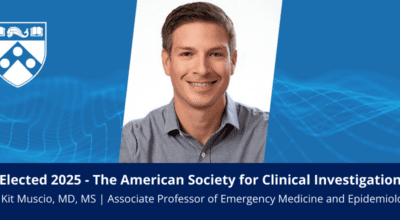
M. Kit Delgado, MD, MS, Elected to the American Society for Clinical Investigation
Muscio Kit Delgado, MD, MS, Associate Professor of Emergency Medicine and Epidemiology, has been elected to the ASCI. His research blends behavioral and data science with insights gleaned from practicing emergency medicine in an urban trauma center to help promote smarter health choices and policy.

Celebrating Informatics Excellence: Johnson and Shen Recognized by ACMI
Kevin B. Johnson, and Li Shen—faculty in the Division of Informatics—were recognized by the American College of Medical Informatics (ACMI) at the AMIA 2024 Annual Symposium.

Using AI to Uncover Hospital Patients’ Long COVID Care Needs
In a new study, Yong Chen, PhD and colleagues at Penn Medicine, used AI and latent transfer learning to analyze long-COVID data, identifying four patient sub-populations with distinct care needs, improving hospital resource allocation and tailoring treatment for diverse patient populations.

AI Tool Analyzes 30K Data Points Per Medical Imaging Pixel in Cancer Search
Mingyao Li, PhD and her Penn Medicine colleagues developed an AI-powered tool called MISO (Multi-modal Spatial Omics) that can detect cell-level characteristics of cancer by looking at data from extremely small pieces of tissue—some as small as the width of five human hairs.

Vaccine Communication in a Polarized World: Dr. Morris Interviewed in Undark Magazine
Amid rising polarization and misinformation, Jeffrey Morris, PhD, of Penn Medicine tackles vaccine skepticism with evidence-based insights. In an interview with Undark, he advocates respectful dialogue that considers social and political dynamics.

The University of Pennsylvania Prevention Research Center Awarded a $6.5 Million CDC Grant
The University of Pennsylvania Prevention Research Center has received a $6.5 million CDC grant to advance community-based prevention research, focusing on improving shared decision-making for older cancer patients. This five-year project will study interventions tailored to patients’ needs, enhancing outcomes in Philadelphia and beyond.

New Framework for Health Policy Evaluation: Target Trial Emulation Enhances Accuracy in Nonexperimental Studies
In Annals of Internal Medicine, Nicholas Seewald, PhD, introduces a framework for target trial emulation, enabling researchers to evaluate health policies with the rigor of clinical trials in nonexperimental studies.